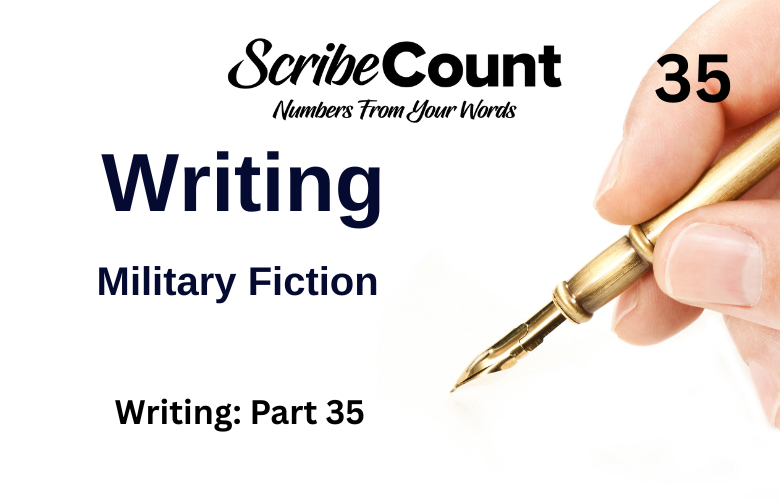Military Fiction for Indie Authors: How to Write Stories of Combat, Duty, and Brotherhood
Military fiction is a genre rooted in realism, action, and emotional stakes. It explores warfare—not just as spectacle, but as a crucible of character, discipline, loyalty, and sacrifice. Whether you're writing battlefield thrillers, wartime drama, elite special forces action, or political military sagas, the heart of military fiction lies in the people who serve, the missions they undertake, and the toll it takes on body and soul.
The genre is as much about why people fight as it is about how. Readers of military fiction are drawn to courage under fire, the ethics of command, life-or-death decisions, and camaraderie forged in impossible circumstances. They value authenticity, emotional intensity, and moral complexity.
For indie authors, military fiction offers a path to a devoted readership of veterans, service members, history buffs, and action-thriller fans. Whether you're writing historical campaigns, near-future conflicts, or entirely fictional wars, this guide will help you build stories with tactical precision, emotional resonance, and honor.
What Makes a Military Fiction Novel?
A military fiction novel focuses on armed conflict, military life, or warfare as a central element of the plot. It may be set during a real-world war, in a fictional campaign, or in a speculative future—but the narrative centers around combat operations, command structures, or the life of a soldier.
Essential characteristics include:
-
Military Setting or Context: The story takes place in or around a war zone, military base, ship, battlefield, or operational theater—past, present, or future.
-
Service-Oriented Protagonists: Characters are active duty, reservists, veterans, or tied to military operations. Their roles define their worldview and choices.
-
Authentic Tactical Detail: Readers expect accurate military language, weapons, procedures, and command structures—even in fictionalized or futuristic settings.
-
Themes of Duty, Honor, Sacrifice: Military fiction explores the burdens of service, the bonds of brotherhood/sisterhood, and the consequences of violence.
-
Conflict Beyond the Enemy: In addition to combat, characters face moral dilemmas, emotional trauma, political pressure, or internal leadership struggles.
Military fiction often overlaps with action thrillers, war novels, and political fiction—but its identity is rooted in the realities of military life.
The Popularity of Military Fiction
Military fiction has always held a firm place in publishing—both mainstream and indie. From timeless classics like The Things They Carried by Tim O’Brien and All Quiet on the Western Front by Erich Maria Remarque, to modern bestsellers like Red Metal by Mark Greaney and One Rough Man by Brad Taylor, readers continue to flock to stories of combat and courage.
In indie circles, military sci-fi and special operations thrillers are booming—especially on Kindle Unlimited. Authors like Jason Kasper, Jack Carr, and Nicholas Sansbury Smith have built large audiences by blending authentic knowledge with gripping, fast-paced plots.
Audiobooks also perform exceptionally well in this genre, with high engagement from military communities, outdoor workers, truckers, and action fans. For indie authors with real-world experience—or the discipline to research deeply—military fiction can become a powerful niche with global reach.
Reader Expectations for Military Fiction
Military fiction readers are exacting. They want realism, structure, and emotional authenticity. Whether or not your story is based on a real conflict, readers expect:
-
Accuracy: Realistic ranks, tactics, weapons, radio comms, and military procedure. Even fictional tech needs consistent logic and terminology.
-
Strong Protagonists: Soldiers, Marines, SEALs, officers, or medics—they should feel competent, professional, and deeply human. Competence is sexy. So is emotional conflict.
-
Moral Conflict: Readers want more than just good guys vs. bad guys. They expect shades of gray: ethical dilemmas, conflicting orders, and wartime ambiguity.
-
Action with Purpose: Explosions and shootouts need stakes. Missions should matter—either strategically or personally.
-
Team Dynamics: Unit cohesion, leadership conflict, and camaraderie under pressure drive the heart of many military stories.
-
Respect for Service: Whether you're honoring or critiquing the military institution, tone matters. Readers want the portrayal of service to feel grounded and honest.
Deliver grit and emotion, and readers will follow you deep into the fire.
Common Tropes in Military Fiction Novels
These recurring tropes appear across the genre and help define its tone and structure:
-
The Special Forces Mission: A high-risk, black-ops team undertakes a mission behind enemy lines—often secretly. Think Jack Carr's The Terminal List.
-
The Military Trial / Chain-of-Command Drama: A soldier disobeys orders—or is wrongly accused—and must fight a bureaucratic or legal battle within the system.
-
The Battle-Hardened Veteran: A soldier returns home but can’t leave the war behind. Stories explore PTSD, reintegration, and survivor’s guilt.
-
Boot Camp / Training Arc: A raw recruit is forged into a soldier through brutal training and personal growth. Great for origin stories.
-
Last Stand or Heroic Sacrifice: A unit is cut off, outgunned, and outnumbered—but refuses to quit. Think Black Hawk Down or We Were Soldiers.
-
Geopolitical Fallout: A mission goes sideways and sparks political chaos—raising the stakes from bullets to nuclear brinkmanship.
These tropes succeed when built on strong characters and grounded realism.
Structuring Your Military Fiction Novel: The Plot Map
Here’s a tactical structure to help pace your novel like a battle plan:
-
Situation Briefing: Introduce the unit, mission objective, and operating environment. Lay out what’s at stake—for the character, the team, or the world.
-
Deployment: The team or protagonist enters the field—be it boot camp, enemy territory, or a war zone. Show how military life shapes behavior.
-
First Engagement / Challenge: An initial mission or obstacle tests the protagonist’s skill and resilience. This may go wrong, setting up deeper conflict.
-
Escalation and Loss: The cost of war rises—comrades die, orders contradict values, trust is tested. The mission may change or fail.
-
The Turning Point: The protagonist must choose between obedience and conscience, survival and sacrifice, loyalty and truth.
-
Final Operation / Resolution: The climax brings emotional and tactical stakes together—one last mission, redemption, escape, or confrontation.
-
Aftermath: Close with emotional resonance—victory, loss, or the haunting question of “Was it worth it?”
Final Thoughts for Indie Military Fiction Writers
Writing military fiction means walking the line between action and authenticity, between spectacle and substance. It’s not about glorifying war—it’s about understanding what war does to those who fight it, and why they fight at all.
As an indie author, you have freedom to tell the stories that matter to you. You can write heroes who don’t look like the standard template, explore overlooked conflicts, challenge assumptions, or blend military realism with speculative fiction.
Whether you served or not, readers will respond to honesty, precision, and heart. If your story respects the reality of service, captures the bond between warriors, and speaks to the cost of combat—then you’ve written more than military fiction. You’ve written something that honors the human spirit in the fog of war.

